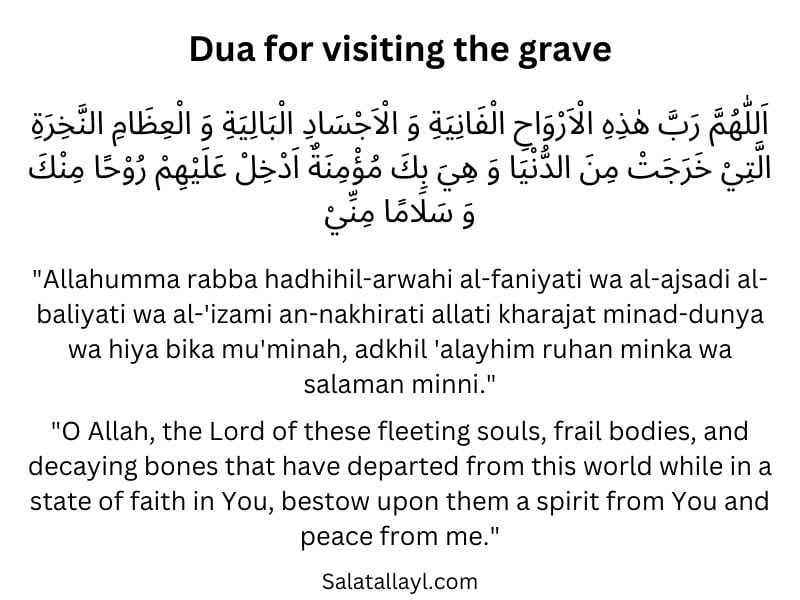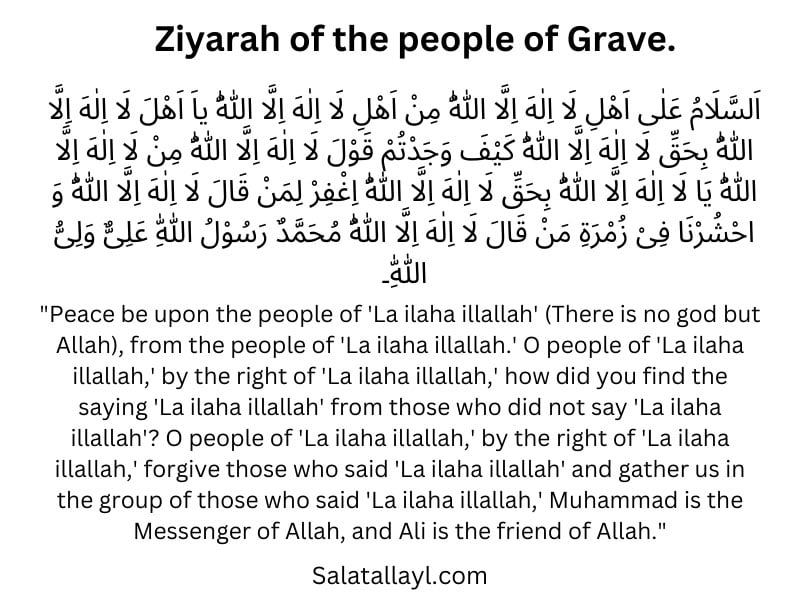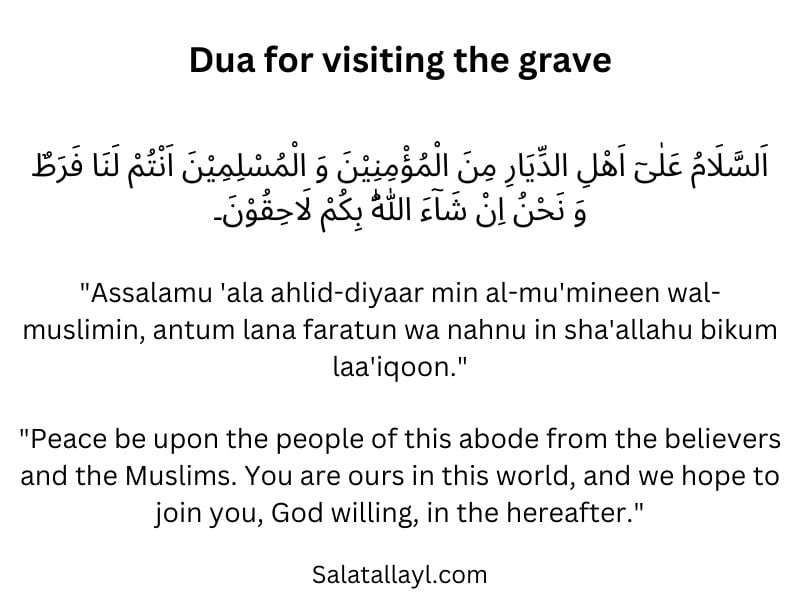Dua for visiting the grave is a supplication with splendid rewards from Almighty Allah SWT. Imam al-Husain a.s. (ﷺ) has said that whoever enters the graveyard and recites the dua for visiting the grave, Almighty Allah will account him rewards that are so much that creatures from the time of Prophet Adam until the day of judgment.
A long time ago, a wise man named Shaykh Ja’far heard ‘Amr speak. ‘Amr said that Imam Abu’l-Hasan Musa talked about visiting special people. He said, “If you can’t visit us, visit good people who follow us. You’ll get a reward like you visited us. If you can’t talk to us, talk to people who follow us. You’ll get a reward like you talked to us.”
Someone named Muhammad once said he was in a place called Fayd with ‘Ali. They visited a grave, and ‘Ali told a story. The person in the grave said that Imam al-Rida once said that if you go to a friend’s grave and touch it while reading a special prayer seven times, you’ll be safe on a scary day.
Dua for visiting the Grave audio.
Dua for graveyard Islam.
Concept of afterlife and Importance of dua.
Making dua for the deceased is an act of kindness that holds spiritual value. We don’t know what they are going through in Aalam-e-Barzaqh (A place for souls after death). After all, who knows, they might be eagerly waiting for our duas to uplift their soul in Aalam-e-Barzaqh.
Aalam-e-Barzaqh is a place that people have to live in until the day of Judgment, and they also give their accounting of actions they did in this life.
The Judgement is based on our beloved Prophet Muhammad’s (ﷺ) teachings and following the basic principles of Islam. If their good deeds are more they will, Inshallah, have a peaceful journey until the day of Judgment, and Astaghfirullah, if they have bad deeds more, they will face the consequences of it in the afterlife, which is Aalam-e-Barzaqh.
Dua for visiting the Grave.
Dua for visiting the Grave in English.

- Dua for visiting the Grave audio.
- Concept of afterlife and Importance of dua.
- Dua for visiting the Grave.
- Transitioning from one world to another.
- Power of dua for visiting the Grave in Islam
- The Etiquette of dua for visiting the Grave.
- Dua for Seeking Forgiveness.
- What do you say when you see a grave in Islam?
- How do you respect a dead in Islam?
- What do you say when you visit the Prophet grave?
- When to visit the grave in Islam?
- Should you visit grave in Islam?
- Can you visit graveyard without wudu?
- What is the last prayer before burial?
- What Surah to recite at graveyard?
Transitioning from one world to another.
The Quran reveals a thought-provoking verse: “Why, but when the soul reaches the throat of the dying, and at that moment you are watching – and We are nearer to him than you, but you don’t see Us.” (Quran 56:83)
When an individual approaches the end of their earthly journey, the Angel of Death appears to collect their soul. This sacred encounter occurs irrespective of the person’s location.
The departing soul perceives the Angel, communicates, and bears witness to this profound moment. However, these interactions occur beyond the realm of eyes, ears, or spoken words.
The precise nature of this communication remains a mystery to the living. Have you ever wondered why we can’t see when an angel of death comes to take the soul?
Numerous such experiences have been documented. For instance, Ibn Abi’d-Dunya recounts an incident surrounding the death of ‘Umar b. ‘Abdu’l-‘Aziz. As he neared the end of his life, ‘Umar b. ‘Abdu’l-‘Aziz gathered those around him and uttered, “Sit with me.”
In his final moments, he acknowledged his shortcomings and expressed submission to the divine: “I am the one You commanded, and I failed you. You forbade me, and I rebelled.” This declaration was repeated three times.
Subsequently, he proclaimed, “But there is no god but Allah.” He then fixed his gaze upward and intensely observed something beyond human or jinn.
Responding to inquiries, he described a presence unlike any other, and in that moment, he departed from this world.
There is a reason behind everything we do in Islam and the same way when we visit the grave or make dua for visiting the grave. The main reason is to refresh the Iman (Belief in the oneness of Allah and the day of judgment is near) and to remember that our final destination in this world is grave. For instance, in Surah As-Sajdah verse 7, the Almighty Allah says:
“He, who has made everything the Almighty Allah SWT, He has created excellent, initiated the creation of man from mere clay.”
- The main benefit is remembering your death and the deceased, reminding yourself that the final destiny will be either Jannah (Paradise) or Dozakh (Hell).
- The deceased person also gets rewards in the afterlife if the visitor makes dua for entering the grave or says the greeting: “May peace be upon the residents of these abodes, the believers and Muslims. May Allah shower His mercy upon those who preceded us and those who will follow, and, God willing, we will certainly join you.” (Narrated by Muslim, 974)
Power of dua for visiting the Grave in Islam
Jabir ibn Abdullah reported: The Prophet (ﷺ) visited his son Ibrahim’s grave and spoke over there these words:” O “Our eyes shed tears, and our hearts feel sorrow. but we do not say anything except that pleases our Lord. Indeed, grieved by your departure, O Ibrahim.” (Sahih al-Bukhari)
The Etiquette of dua for visiting the Grave.
In Islam, visiting the grave of a believer is Mustahab amal (deeds that are recommended, encouraged, or virtuous, but not obligatory). Treating the deceased person as if he is alive but not in this world, instead in Aalam-e-barzakh, as we need to pray five times a day, a requirement for our Soul, right? They also required blessings in the Name of Prophet Muhammad and his progeny by reciting Salawat.
Paying respect to the deceased person is the best of amal’s (Deeds) because it is a belief that the Day of Judgement is the promise of Almighty Allah and is near.
“Once, ‘Uqbah ibn ‘Amir, a Sahabi (companion) of the Prophet Muhammad (ﷺ), told us: ‘The Prophet said something important. He said that if he were to walk on hot coals or a sword or even mend his shoes with his own feet, all of that would be better for him than stepping on a Muslim’s grave. It doesn’t matter to him whether he relieves himself in a graveyard or the middle of a busy market; both are equally bad.’ This story is from Ibn Majah, 1567.”
Dua for entering Graveyard.
When someone visits the graveyard, it is a good practice to send your blessings on every grave by saying these words: “Assalamu ‘ala ahlil diyari minal mu’minina wal-muslimina wa yarhamullahu al-mustaqdimina minna wal-musta’khiriin. Wa inna in sha’ Allah bikum la lahiqun.”
Dua for visiting the grave in english.
“May peace be upon the residents of this dwelling, from us, the believers and the Muslims. May Allah bestow His mercy upon those among us who have departed and those who are yet to come. Insha’Allah, we shall reunite with you.”
Actions and Dua to read at Graveyard.
- Playing Quranic Verses: Playing Quranic verses or recitations on a phone near the grave can bring blessings to the deceased and provide a soothing atmosphere.
- Cleaning the Grave: Maintaining the cleanliness of the grave is a sign of respect and can bring blessings to the deceased.
- Placing Two Pots: Placing two pots, one with water and the other with food for birds, is a charitable act that can bring blessings to the deceased.
- Planting a Tree: Planting a tree nearby the grave is a form of charity (Sadaqah Jariyah) and can bring continuous blessings to the deceased.
- Facing the Grave: Some scholars suggest standing facing the top of the deceased person’s head, while others recommend facing the chest of the deceased, who would be facing the qibla (Mecca).
- Placing Fresh Green Branches: Placing fresh green branches on the grave, if available, is believed to bring relief to the deceased.
- Sitting with Serenity: When visiting the grave, one should enter and sit at the grave with serenity and reflection, particularly when visiting those who had rights over them, such as parents or relatives.
- Reflecting and Pondering: Reflecting on the state of the deceased and one’s own mortality can be a source of spiritual growth and blessings.
- Reciting the Quran: Reciting verses from the Quran with the intention of the reward going to the deceased can bring blessings to them.
- Making Supplications: Making abundant supplications (duas) for the forgiveness of the deceased can bring joy to the departed soul and invoke blessings.
Ziyarah of the people of Grave (Dua for the Deceased).

“As-salamu ‘alaykum ahl-i la ilaha illallah min ahl-i la ilaha illallah. Ya ahl-i la ilaha illallah bi haqqi la ilaha illallah. Kayfa wajadtum qawla la ilaha illallah min la ilaha illallah. Ya la ilaha illallah bi haqqi la ilaha illallah, ighfir li man qala la ilaha illallah wa ishurna fi zumrat-i man qala la ilaha illallah, Muhammadun rasulullah, ‘Aliyun waliyyullah.”
Dua for Seeking Forgiveness.
Many Dua can be recited for seeking forgiveness from Almighty Allah. Our merciful Allah is so generous and so kind. By saying this tiny word, “Astaghfirullah,” from the heart, he can forgive all our sins, big or small. Complete information is available on this, and I suggest you click here to read more.
What do you say when you see a grave in Islam?
When you visit the graveyard in Islam, you say the following.
“Assalamu ‘alaikum ya ahlal qubur, ya maghfiratil li-ahlil qubur. Peace be upon you, O inhabitants of the graves, O those who have been granted forgiveness among the inhabitants of the graves.”
How do you respect a dead in Islam?
After a person has passed away in Islam, it is recommended (Mustahab) perform specific actions as follows:
a) Close the eyes and the mouth of the deceased.
b) Straighten the arms alongside their body and keep the legs straight.
c) Cover the body with a sheet of cloth.
d) If the death occurs at night, ensure the body is not left in darkness.
e) Expedite the burial process and avoid unnecessary delays.
f) Inform fellow believers (Mo’mineen) about the funeral.
g) Place the deceased’s body facing the Qiblah (the direction of Mecca) during the three purification washings (Ghusls), ensuring that the soles of their feet face the Qiblah.
h) After the three purification washings, lay the body in the same manner as during prayer, with the body on its back, head on the right side, and shoulder facing towards the Qiblah.
What do you say when you visit the Prophet grave?
First, you must greet the Prophet by saying, “Sallallahu ‘alayhi wa sallam.” This phrase is also known as the Salawat or Durood. In some books by Imamiyyah scholars, we have found a particular way to see important figures like Prophets, Holy Imams, loved ones, or parents in our dreams.
“O Allah, You are the forever-Living, beyond all description. Faith originates from You, and all things commence with You, ultimately returning to You. Everything that emerges from Your creation seeks refuge in You, and those who turn away from it find refuge in You alone. There is no escape from Your presence except towards You.”
So, I ask You, there is no deity but You, and I ask You in the name of Allah, the Most Gracious, the Most Merciful, and in the name of Your beloved, Muhammad, peace be upon him, the leader of all the Prophets. And in the name of Ali, the best of successors, and in the name of Fatimah, the lady of all women in the worlds, and in the name of Hasan and Husain, the two leaders of the youth in Paradise.
Peace be upon them all. I ask You to bless Muhammad and his family, and to show me my deceased in the same state that they are in.”

“Allahumma inni as’aluka bi haqqi Muhammadin wa aali Muhammadin allaa tu’azzib haadha al-mayyit.”
In a hadith from Prophet Muhammad (ﷺ), it was said that every Friday, the souls of your loved ones and souls of the believers come down from the lowest sky upon their houses and homes, and each of the souls, in a sad tone ask O my O, my mother! Oh, my relatives! Be generous to us. May Allah have mercy upon you by giving out something we possess in life. Be gracious to us by doing the good work in the name of Allah. Give out as alms a dirham, a loaf of bread, or a dress so that Almighty Allah SWT will dress you from the garments of Jannah.
You can do this by reciting specific chapters from the Quran:
- Surah al-Shams (No. 91).
- Surah al-Layl (No. 92).
- Surah al-Qadr.
- Surah al-Kafirun.
- Surah al-Tawhid.
- Surah al-Falaq.
- Surah al-Nas.
After that, repeat Surah al-Tawhid one hundred times and send blessings upon the Holy Prophet and his Household one hundred times. Ensure you have performed the ritual ablutions (wudu) and then sleep on your right side. By doing this, you may have a dream in which you see and converse with the person Allah intends for you to meet.
In another version, you can follow this practice for seven nights after reciting this special supplication.
When to visit the grave in Islam?
In Islam, visiting the grave of your loved ones to pay tribute can be done any time of the week, but based on the teachings of our beloved Prophet Muhammad (ﷺ), the recommended days to visit the grave are Thursday and Friday. The Islamic “Alim” (plural: “Ulama”), who possesses deep religious and Islamic knowledge, says the spirits of the dead return to their graves at these times. As we all know, after this life, we must live in Aalam-e-Barzakh until the Day of Judgement.
Should you visit grave in Islam?
In Islam, visiting the grave of a believer is Mustahab amal (deeds that are recommended, encouraged, or virtuous, but not obligatory). For reference, you can read the below hadith of our Prophet Muhammad (ﷺ).
The Prophet Muhammad (may Allah’s peace and blessings be upon him) prohibited specific actions regarding graves. He said we should not pray while facing a grave, meaning our prayer direction should not be towards a grave. Additionally, he advised against sitting on graves.
It’s also important to note that disrespecting graves by putting one’s feet on them or using them as a place for relieving oneself is considered unlawful and inappropriate.
Can you visit graveyard without wudu?
Yes you can visit the grave even without wudu and recite the dua for visiting the grave or some of the Surah from the Holy Quran, such as Surah Al-Fatiha (Chapter 1), Surah Al-Ikhlas (Chapter 112), Surah Al-Falaq (Chapter 113), Surah Al-Nas (Chapter 114), Surah Yasin (Chapter 36), and Surah Al-Qiyamah (Chapter 75).
What is the last prayer before burial?
The last prayer before the burial is called Namaz-e-Janaza, also called Ṣalāt al-Janāzah in Arabic. The Muslim community performs a special funeral prayer to seek Allah’s mercy and forgiveness for the deceased and to ask for peace and blessings upon them. Salat al-Janazah is an essential part of Islamic funeral rites and is typically offered in congregation by Muslims at the funeral. It is a collective supplication on behalf of the deceased person.
What Surah to recite at graveyard?
Many recommended Surah can be recited or dua for visiting the grave. Here are some surahs from the Holy Quran that are recommended.
| Surah | Arabic Name | Purpose |
|---|---|---|
| Al-Fatiha | الفاتحة | Seeking Allah’s mercy and forgiveness. |
| Al-Ikhlas | الإخلاص | Affirming the Oneness of Allah. |
| Al-Falaq | الفلق | Seeking protection from evil and harm. |
| Al-Nas | الناس | Seeking refuge with Allah from evil. |
| Yasin | ياسين | Comforting the deceased and seeking blessings. |
| Al-Qiyamah | القيامة | Reflecting on the concept of the Day of Judgment. |
| Ar-Rahman | الرحمن | Reflecting on Allah’s merciful attributes. |
| Al-Mulk | الملك | Seeking protection from the punishment of the grave. |
| Al-Waqi’ah | الواقعة | Reflecting on the consequences of deeds in the hereafter. |
| Al-Inshirah | الإنشراح | Seeking ease and relief for the deceased. |
These Surahs are recited to remember the deceased, pray for their well-being in the afterlife
